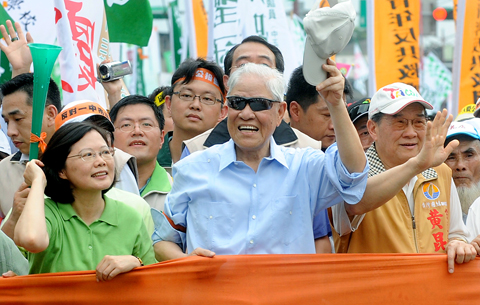President Ma Ying-jeou (馬英九) yesterday promised that an economic cooperation framework agreement (ECFA) Taipei plans to sign with Beijing on Tuesday would not lead to a “one China market.”
Ma said he respected the Democratic Progressive Party’s (DPP) decision to hold a demonstration calling for a referendum on an ECFA yesterday because holding parades and assemblies was a right guaranteed by the Constitution.
As the theme of the opposition-led protest was “Oppose a one China market, hold a referendum,” Ma said the planned pact would not lead to a “one China market.” However, the president did not elaborate.

PHOTO: CNA
Ma made the remarks in Kaohsiung County yesterday morning while attending a ribbon-cutting ceremony for the Jiasian Bridge (甲仙大橋), which collapsed during Typhoon Sinlaku in 2008.
Ma said his administration would not dodge legislative oversight, adding that the proposed accord would be sent to the Executive Yuan for approval on July 1 before proceeding to the legislature.
Instead of blindly opposing the trade deal, Ma said, he urged the DPP to jointly oversee the legislative process.
Meanwhile, Chinese Nationalist Party (KMT) spokesman Su Jun-pin (蘇俊賓) yesterday said his party respected freedom of speech, but added that opposition parties should supervise the government in a more rational manner rather than categorically reject an ECFA.
Su said the public could clearly see the commercial advantages that an “early harvest” list would bring, while the DPP’s appeal against it was vague and flimsy.
“We’re not sure whether they are against an ECFA entirely or just part of it,” he said. “We don’t even know what kind of questions they want to ask in the referendum. With so much ambiguity, how do they expect the public to come out and support them?”
With the five special municipality elections to be held in November, Su said his party would face ECFA-related issues head-on and beef up a promotional campaign to advertise the benefits the trade pact would have on Taiwan’s industries and on the balance of regional development.
The Presidential Office will also join the promotional campaign, Presidential Office Spokesman Lo Chih-chiang (羅智強) said. Lo said that Ma, after the deal is signed next week, would reveal his vision for the country’s global economic strategy in the “post-ECFA” era.
The plan would serve as the blueprint for the “golden decade” he envisioned, Lo said, adding that it would cover business transformation, attracting foreign investment and assisting disadvantaged industries in coping with the impact of the trade deal.

‘DENIAL DEFENSE’: The US would increase its military presence with uncrewed ships, and submarines, while boosting defense in the Indo-Pacific, a Pete Hegseth memo said The US is reorienting its military strategy to focus primarily on deterring a potential Chinese invasion of Taiwan, a memo signed by US Secretary of Defense Pete Hegseth showed. The memo also called on Taiwan to increase its defense spending. The document, known as the “Interim National Defense Strategic Guidance,” was distributed this month and detailed the national defense plans of US President Donald Trump’s administration, an article in the Washington Post said on Saturday. It outlines how the US can prepare for a potential war with China and defend itself from threats in the “near abroad,” including Greenland and the Panama

A wild live dugong was found in Taiwan for the first time in 88 years, after it was accidentally caught by a fisher’s net on Tuesday in Yilan County’s Fenniaolin (粉鳥林). This is the first sighting of the species in Taiwan since 1937, having already been considered “extinct” in the country and considered as “vulnerable” by the International Union for Conservation of Nature. A fisher surnamed Chen (陳) went to Fenniaolin to collect the fish in his netting, but instead caught a 3m long, 500kg dugong. The fisher released the animal back into the wild, not realizing it was an endangered species at

The High Prosecutors’ Office yesterday withdrew an appeal against the acquittal of a former bank manager 22 years after his death, marking Taiwan’s first instance of prosecutors rendering posthumous justice to a wrongfully convicted defendant. Chu Ching-en (諸慶恩) — formerly a manager at the Taipei branch of BNP Paribas — was in 1999 accused by Weng Mao-chung (翁茂鍾), then-president of Chia Her Industrial Co, of forging a request for a fixed deposit of US$10 million by I-Hwa Industrial Co, a subsidiary of Chia Her, which was used as collateral. Chu was ruled not guilty in the first trial, but was found guilty

DEADLOCK: As the commission is unable to forum a quorum to review license renewal applications, the channel operators are not at fault and can air past their license date The National Communications Commission (NCC) yesterday said that the Public Television Service (PTS) and 36 other television and radio broadcasters could continue airing, despite the commission’s inability to meet a quorum to review their license renewal applications. The licenses of PTS and the other channels are set to expire between this month and June. The National Communications Commission Organization Act (國家通訊傳播委員會組織法) stipulates that the commission must meet the mandated quorum of four to hold a valid meeting. The seven-member commission currently has only three commissioners. “We have informed the channel operators of the progress we have made in reviewing their license renewal applications, and